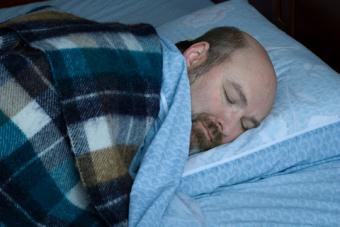
Somnolence can refer to a natural state a person experiences during the onset of sleep, but it can also refer to a sleep disorder that can interfere with daily life.
Definition of Somnolence
The definition of somnolence is a state of sleepiness or drowsiness. A person is in this state when he or she is neither fully awake nor fully asleep. For example, when you experience this state of drowsiness, you are not fully aware of your surroundings, but you are not unconscious.
Somnolence leads to impairment because you are not entirely conscious, and awareness may be comparable to the following conditions:
- Sleepwalking is a state similar to being somnolent because the person is navigating the surroundings without conscious awareness.
- When a person is in a coma, he or she is in a profound state of unconsciousness that cannot be disrupted. The person does not experience sleep-wake cycles.
- A stupor is when someone is unresponsive to his or her surroundings, but appears to be conscious.
You may be familiar with the experience of being between sleeping and waking states, especially when you think about drifting off to sleep, but what happens when this state appears at other times? Somnolence can also refer to a sleep disorder in which a person becomes somnolent, even when the onset of sleep is not present. The chronic condition occurs when the person falls into a semiconscious state independently of natural circadian rhythms.
Somnolence and Sleep Disorders
Sleep disorders are often associated with sleep deprivation and insomnia, but many sleep problems include conditions that involve excessive daytime sleepiness, and sleeping too much. Somnolence can involve sleeping too many hours as well as a strong desire to sleep.
Hypersomnia
Drowsiness is present in hypersomnia, a condition in which a person experiences excessive daytime sleepiness in spite of getting adequate rest the night before. A person suffering from this condition may become drowsy at inappropriate times, and may have difficulty functioning normally.
Narcolepsy
Narcolepsy is a medical condition that causes a person to involuntarily fall asleep without warning. The intense drowsiness causes the affected invidiual to fall into the REM (rapid eye movement) stage of sleep immediately rather than following the normal stages of sleep. Narcolepsy is a neurological condition that requires treatment.
Shift Work Sleep Disorder
Shift work sleep disorder disrupts the body's natural circadian rhythm because the indiviual does not have a regular sleep-wake routine. As the sleep-wake cycle is disrupted, the individual may experience periods of somnolence at inconvenient times.
Sleep Apnea
Sleep apnea is a condition in which the person's breathing ceases during sleep. The person may not be aware of the sleep disorder, but daytime fatigue is usually present. Obstructive sleep apnea is a medical condition that requires a sleep study for proper diagnosis, and treatment is crucial to the affected individual's health and wellbeing.
Other Causes of Somnolence
Infection can cause a person to become somnolent. When the body is trying to fight an infection, it may shut down to save energy. The energy conservation is believed to cause the affected individual to remain in a groggy state until the infection ceases.
Certain types of medication can cause drowsiness in some individuals.
- Zolpidem is a medication that induces sleep, and it may be used to treat insomnia.
- Mirtazapine is a medication used to treat depression.
Depression and seasonal affective disorder can lead to feelings of intense fatigue and low energy. The inability to focus and general malaise can factor into drowsiness as well.
Other conditions that can make a person somnolent are:
- Encephalitis
- Fibromyalgia
- Lyme disease
Confusion upon Waking
A confused state upon walking, also known as sleep inertia,may be mistaken as somnolence. Sleep inertia may involve disorientation, problems recognizing whether it is day or night, and grogginess. This condition typically lasts a few minutes, but if sleep inertia is present for a few hours and interrupts your ability to function normally, it is imperative to see a doctor about the problem.
Getting Help for Somnolence
In many cases, somnolence is perfectly normal, and it requires no treatment. You may feel drowsy and have an intense desire to fall asleep with good reason. When the drowsiness occurs excessively without any apparent reason, it is necessary to discuss the problem with your doctor. Proper diagnosis of an underlying medical condition can lead to a solution.







